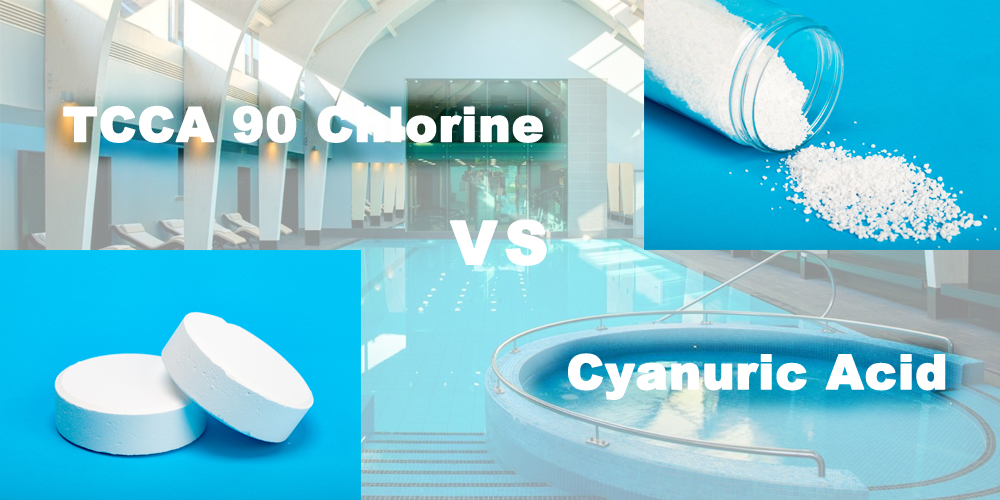In the field of swimming pool chemicals, TCCA 90 Chlorine (trichloroisocyanuric acid) and cyanuric acid (CYA) are two common swimming pool chemicals. Although they are both chemicals related to swimming pool water quality maintenance, they have obvious differences in chemical composition and function.
TCCA 90 Chlorine (Trichloroisocyanuric Acid)
Chemical Properties
TCCA 90 Chlorine is also called trichloroisocyanuric acid. The chemical formula is C3Cl3N3O3, which is an organic compound with strong oxidizing properties. It is white. The regular TCCA has an effective chlorine content of 90%min, so it is often called TCCA 90.
Its molecular structure contains three chlorine atoms, which give TCCA 90 Chlorine strong oxidizing and disinfecting effects. When TCCA 90 Chlorine is dissolved in water, the chlorine atoms are gradually released to form hypochlorous acid (HOCl), which is an effective ingredient for killing bacteria, viruses and other microorganisms. And cyanuric acid is also generated when dissolved in water. Cyanuric acid can act as a stabilizer to prevent the rapid decomposition of chlorine in swimming pools due to ultraviolet exposure.
TCCA 90 Chlorine is widely used in the following fields:
Water treatment: TCCA 90 Chlorine is a common chemical for disinfection of swimming pools, aquariums, and drinking water. It usually comes in tablet form.
Agriculture: Used for disinfection of agricultural tools, seed treatment, and preservation of fruits and vegetables.
Health care: Used for disinfection of medical devices and environmental disinfection.
Industry: Used for industrial water disinfection and wastewater treatment.
Function of TCCA 90 Chlorine
High-efficiency disinfectant: TCCA 90 kills microorganisms quickly by releasing hypochlorous acid.
Long-term effect: It dissolves slowly and can continuously release chlorine, which is suitable for maintaining the water quality of swimming pools for a long time. Cyanuric acid produced after dissolving in water can act as a stabilizer to prevent the rapid decomposition of chlorine in swimming pools due to ultraviolet exposure.
Cyanuric acid
Chemical properties
The chemical formula of cyanuric acid (CYA) is C3H3N3O3, which is a triazine ring compound with a white color. It is mainly used as a chlorine stabilizer for water treatment and disinfection. In swimming pools, its function is to reduce the rate of ultraviolet decomposition of free chlorine in water by combining with hypochlorous acid to form chlorocyanuric acid, thereby prolonging the effectiveness of chlorine. It has no disinfecting effect and cannot be used directly for disinfection. It is often sold as a chlorine stabilizer or chlorine protector. It is suitable for open-air pools disinfected with calcium hypochlorite.
Application areas
Cyanuric acid is mainly used in the following areas:
Swimming pool water treatment: As a chlorine stabilizer, it prevents free chlorine from decomposing rapidly under the action of sunlight and high temperature.
Industrial water treatment: It is used to stabilize chlorine in industrial circulating water treatment.
Function of cyanuric acid
Chlorine stabilizer: The main function of cyanuric acid is to protect the chlorine in swimming pools from degradation by solar ultraviolet rays. Studies have shown that in the absence of cyanuric acid, the chlorine in pool water may be rapidly reduced by 90% in 1-2 hours under sunlight. After adding an appropriate amount of cyanuric acid, the degradation rate of chlorine will be significantly reduced.
Difference between TCCA 90 Chlorine and cyanuric acid
| Feature | TCCA 90 Chlorine | Cyanuric Acid |
| Chemical Formula | C₃N₃Cl₃O₃ | C₃H₃N₃O₃ |
| Main Component | Contains Chlorine | Chlorine-Free |
| Function | Powerful Disinfectant | Chlorine Stabilizer |
| Stability | Stable under Dry Conditions | Good Stability |
| Application | Water Treatment, Agriculture, Medical, Environmental Disinfection, etc. | Swimming Pool Water Treatment, Industrial Water Treatment |
Precautions
TCCA 90 Chlorine has strong oxidizing properties. When using it, you should pay attention to protection and avoid contact with skin and eyes.
Although cyanuric acid is relatively safe, excessive use will also have adverse effects on aquatic organisms.
When using TCCA 90 Chlorine and cyanuric acid, you should strictly follow the product instructions and pay attention to controlling the dosage.
Post time: Nov-20-2024

